‘Vicious circle’: Femicides in Peru reveal ‘crisis’ of violence
A string of high-profile murders has drawn attention to rates of gender-based violence in the South American country.
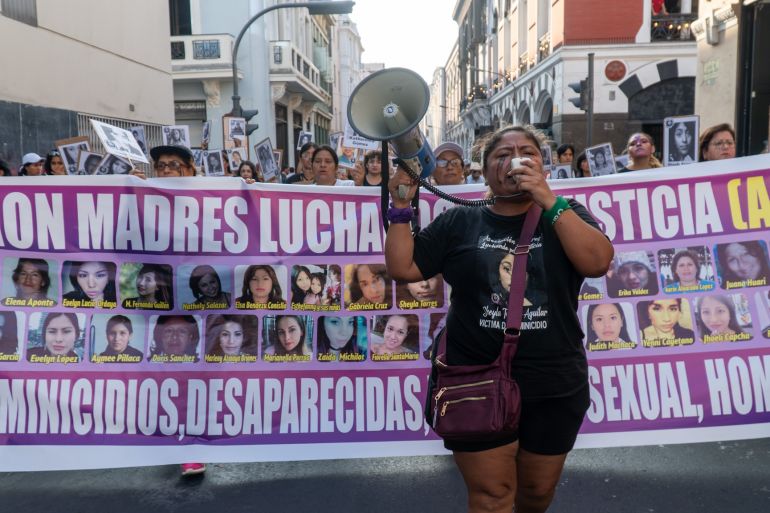
Lima, Peru – Last month, 18-year-old Katherine Gómez finally decided to end her brief relationship with her boyfriend, Sergio Tarache. It was a Saturday evening, and despite having planned a night out with friends, she acquiesced to meet him one last time in a crowded plaza in central Lima.
The couple began to argue and Tarache abruptly left, according to witnesses. Moments later, surveillance footage revealed him buying gasoline at a nearby station. He returned, doused Gómez and set her aflame with a lighter, fleeing the scene as she burned alive.
Keep reading
list of 3 itemsArgentina: rap, reform and gender rights
Photos: Women’s Day protesters demand gender equality
Nearly six days passed before a superior court judge in Lima issued an arrest warrant. Tarache, 21, had already fled the country. Meanwhile, Gómez, suffering severe burns to her chest and face, died of respiratory failure in an induced coma.
Nine days after the attack, on March 27, an 11-year-old Indigenous girl was found on the cusp of death in the Amazon region of Ucayali. Two nails were lodged into her skull after her 25-year-old stepbrother attempted to rape her.
And two days after that, on March 29, a 32-year-old nurse was discovered naked and covered in blood after a night out with two male coworkers in the southern department of Puno.
She was rushed to the hospital where she was treated for head trauma and mutilated genitalia. But following an infection that necessitated a leg amputation, the mother of three died after 12 days in a coma. Her co-workers were subsequently arrested and await charges.
The brutality of these cases has shocked Peruvians in recent weeks, laying bare what many are calling a systemic “crisis” of gender-based violence.
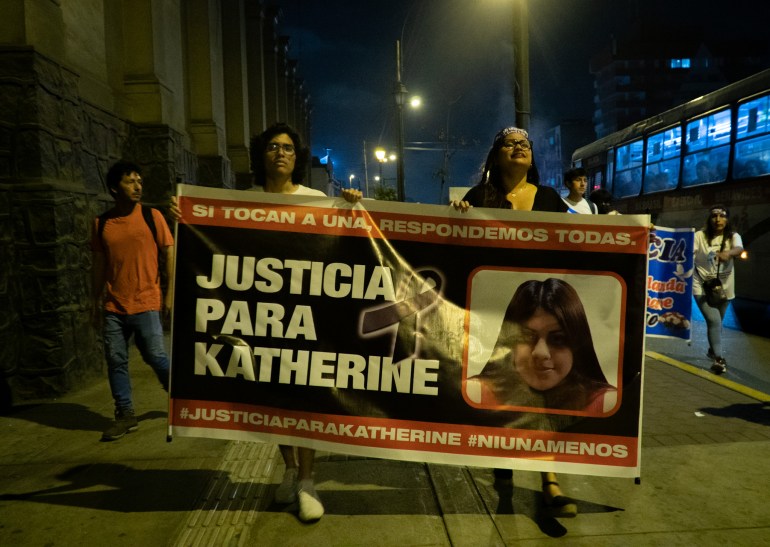
In this country of 33 million, six out of 10 women have experienced some form of physical or sexual violence, and rates of femicide — broadly defined as the intentional, gender-motivated murder of women — are soaring.
Since January, there have been 51 reported femicides in Peru, a figure likely to outpace the 137 recorded last year, according to public officials.
This dark inventory does not account for disappearances. In 2022, there were 11,524 reports of missing women. Only 48 percent of them were found by authorities, according to Peru’s ombudsman.
Describing what many consider an “emergency” to Al Jazeera, government officials, women’s rights organisations and family members faulted entrenched misogyny, mistrust in the justice system and ultra-conservative legislation as contributing to the increasingly violent attacks against women.
“It’s a vicious circle,” said Diana Portal of the ombudsman’s office. “Cases continue to occur, and a negligent state response sends an unfortunate message that in Peru you can rape, disappear or kill a woman without consequence.”
Between January and February of this year, there were 21,194 reported cases of violence against women and girls. Sixteen percent were girls between the ages of 12 and 17, according to data from the Ministry of Women and Vulnerable Populations.
Underscoring the deep mistrust in Peru’s judicial system, a national poll revealed that less than 30 percent of women report incidents of violence to authorities, meaning the vast majority of cases go undocumented.
“It’s a system that fails to comply with due diligence and does not take reports seriously, which aggravates a situation of daily violence,” said Portal.
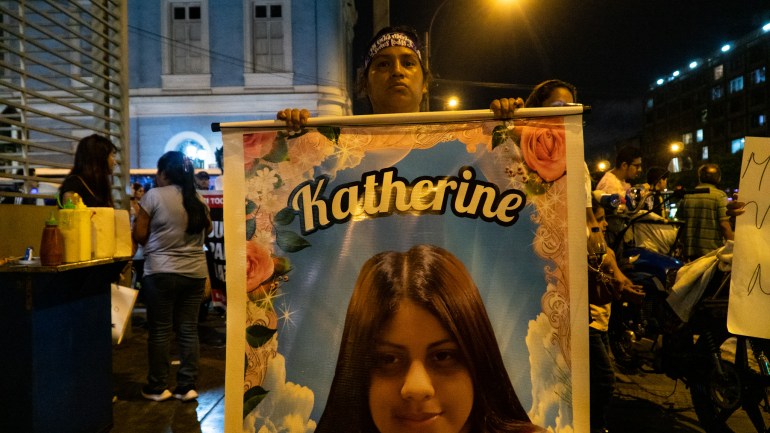
One week after her daughter’s death, Gómez’s mother, Cinthia Machare, clutched a banner with the teenager’s portrait as she marched through downtown Lima, protesting the state’s response to the wave of recent femicides.
“I’m living a nightmare. I enter her room and it’s empty,” said Machare. “There’s a silence in my house because she was the one who brought all the joy to our home.”
Following an international manhunt, Tarache was apprehended on April 11 in Bogota, Colombia, and is awaiting extradition. But critics said the procedural delays that allowed him time to flee reveal a crisis of impunity.
“It is clear that we have work to do in order to recover the confidence of the population in the justice system,” said Patricia Milagros, a representative for the Ministry of Women’s Aurora Program, which provides emergency aid to victims.
Approximately 245 national emergency centres — along with preventive psychological and legal services — offer assistance to victims of sexual violence, according to Milagros.
But gender-rights activists said a lack of state funding for such programmes has resulted in delayed aid to victims, who often abandon their cases. They also called for stronger prevention measures, harsher sentencing for aggressors and meaningful education reforms to address the violence.
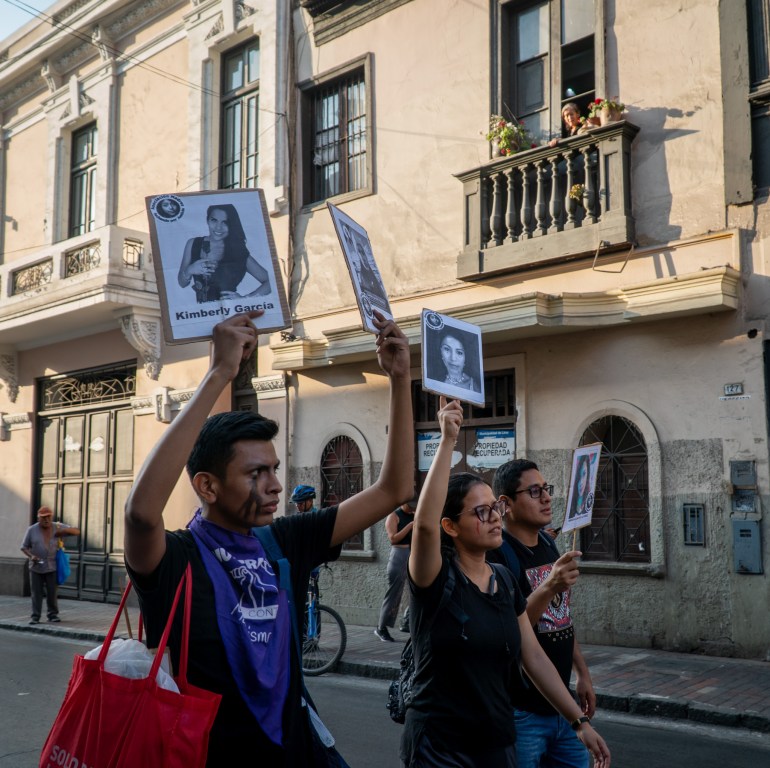
However, in an interview with RPP Noticias, the director of the women’s ministry, Nancy Tolentino, suggested instead that “young women should choose wisely whom they go out with” to avoid such attacks.
While government representatives said her words were misinterpreted, Tolentino’s remarks have sparked accusations of victim blaming.
“These comments show that we live in a society in which violence is shared between aggressors and state institutions,” said Amire Ortiz, the director of Acción Por Igualdad, a national women’s rights nonprofit.
Ortiz and other gender-rights advocates are concerned that comments like Tolentino’s signal an ultra-conservative stance towards women, violence and reproductive health.
In December, Dina Boluarte became the first woman president in Peru’s 201-year history. Despite the milestone, legislation has advanced that could restrict access to therapeutic abortion, including in cases of rape, if signed into law.
Further policy, including a law created in 2022 while Boluarte served as vice president, places limits on gender-focused education in classrooms, allowing parents to veto textbooks and other class materials they deem inappropriate.
“[Boluarte] has demonstrated that just because a woman has risen to a position of political power does not guarantee she will work in favour of women,” said Ortiz.
Standing in front of the Ministry of Women’s headquarters recently, Magali Aguilar unfurled a banner revealing portraits of dozens of victims of femicide. In the centre was her daughter, Sheyla.
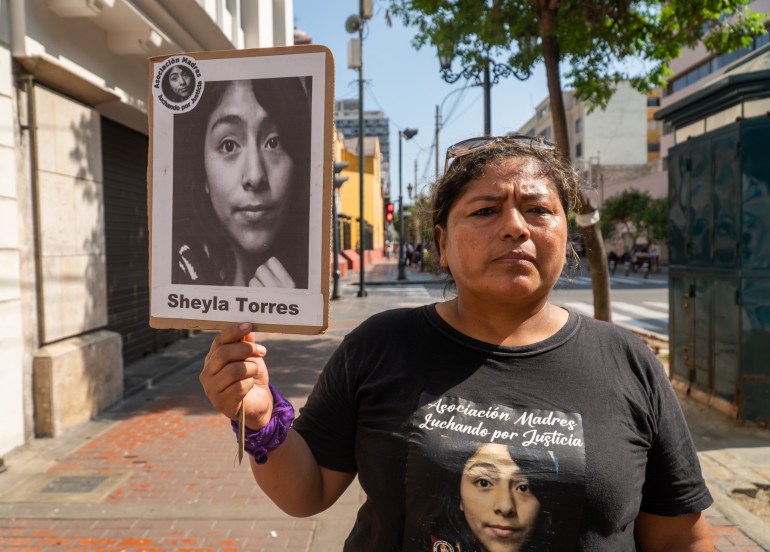
“She was 19 and ready to take on the world. Her dream was to become an obstetrician,” said Aguilar.
In 2018, Sheyla’s ex-boyfriend, Romario Aco, entered an open window in her bedroom and slit her throat.
Aco was given the minimum sentence of 15 years, in part because of his confession. Aguilar said her lawyer, appointed by the Ministry of Women, never showed up to the sentencing hearing.
“He’ll get out when he’s 34 with his whole life ahead of him. And my daughter? Nothing. I go to the cemetery and can’t hug my daughter,” said Aguilar.
In 2020, she formed an association called Mother’s Fighting for Justice, which serves as a support network for bereaved families and holds workshops to teach young women how to recognise and avoid abusive relationships.
“Through our pain, we’re rising up,” Aguilar said. “When we’re together, we cry when we need to, and then we dry our tears and keep fighting so that there isn’t another Sheyla. So that this story doesn’t keep repeating.”